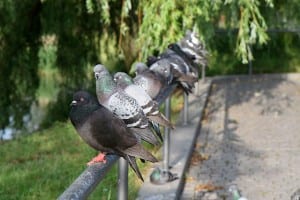
by Pigeon Patrol | Sep 5, 2014 | Pigeon Patrol's Services, Pigeon Spikes, Pigeons in the News, UltraSonic Bird Control
 SEOUL, Sept. 5 (Korea Bizwire) – Piano wire, made for use in piano strings, has found a new, unexpected use in chasing pigeons away so that buildings and structures could avoid premature corrosion as well as bad odor and noise. The Seoul metropolitan city government said on September 4 that it has come up with a novel solution to keep birds away using piano wire by experimentally installing the line on Seongsan No. 1 Bridge and the Seoul Station Overpass.
SEOUL, Sept. 5 (Korea Bizwire) – Piano wire, made for use in piano strings, has found a new, unexpected use in chasing pigeons away so that buildings and structures could avoid premature corrosion as well as bad odor and noise. The Seoul metropolitan city government said on September 4 that it has come up with a novel solution to keep birds away using piano wire by experimentally installing the line on Seongsan No. 1 Bridge and the Seoul Station Overpass.
The solution is based on a simple idea that the birds wouldn’t be able to land on the extremely thin line and would fly away after trying many times. Until now, most bridges and elevated roads have been infested with pigeons, causing bad smell, often unbearable noise, and urban squalor. In some problem spots, the city government tried to install bird blocking nets but found it ineffective as most pigeon habitats were narrow holes or small cracks.
The idea of using piano wire came when a bike rider passing underneath Seongsan No. 1 Bridge petitioned the city government to do something about the pigeon problem and a city officer named Lee Jong-wook at the West Seoul Road Maintenance Corp. under the city government invented the idea after weeks of experiment. He applied for a patent for the idea with the Korea Intellectual Property Office.
Pigeon droppings may cause corrosion of steel parts in the structure as they contain ammonia and acid when they are mixed with rainwater. The droppings are major nuisance to pedestrians walking under bridges and overpasses. The piano wire-based bird chasing device is more cost effective than any other solutions such as the spike needle, bird blocking net, chemical-based bird repellent and ultrasonic bird repeller, which are expensive and often limited in applicable range.
Its installation is also simple, with no need to replace often through the tightness adjustment lever and elastic spring that tightens the line even when the temperature is high. As the wire is made from tempered high-carbon steel, it is durable and can maintain elasticity for a long time.
Lee of the West Seoul Road Maintenance Corp. said, “I thought hard and long about how to address the problem and came up with the idea of piano wire. When I developed the idea, it was winter time, which made it hard to apply any other easily available solutions. I am glad that my simple idea could relieve the problem and make our citizens happy.”
About Pigeon Patrol:
Pigeon Patrol Products & Services is the leading manufacturer and distributor of bird deterrent (control) products in Canada. Pigeon Patrol products have solved pest bird problems in industrial, commercial, and residential settings since 2000, by using safe and humane bird deterrents with only bird and animal friendly solutions. At Pigeon Patrol, we manufacture and offer a variety of bird deterrents, ranging from Ultra-flex Bird Spikes with UV protection, Bird Netting, 4-S Gel and the best Ultrasonic and audible sound devices on the market today.
Voted Best Canadian wholesaler for Bird Deterrent products four years in a row.
Contact Info: 1- 877– 4– NO-BIRD (www.pigeonpatrol.ca)
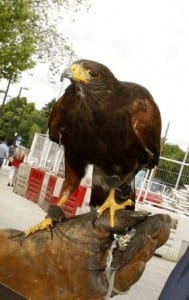
by Pigeon Patrol | Sep 4, 2014 | Bird Deterrent Products, Bird Netting, Pigeon Patrol's Services, Pigeon Spikes, Pigeons in the News, UltraSonic Bird Control
 The Wimbledon tennis championships started today, and if you pay close attention, you might notice an unexpected employee keeping the riff-raff of the courts: a hawk named Rufus.
The Wimbledon tennis championships started today, and if you pay close attention, you might notice an unexpected employee keeping the riff-raff of the courts: a hawk named Rufus.
Every morning, from 5-9am, Rufus patrols the skies above Wimbledon and scares away any pigeons. And he’s been at it for fourteen years.
Lucky for the pigeons, its a humane process. They’re not killed, only scared away. At Nerdist, Kyle Hill explains:
Raptors like Rufus—large predatory birds that include eagles, hawks, and falcons—are nothing to mess with. Whether it is scaring pigeons or throwing goats from cliffs, raptors have the speed, vision, and strength to contend with all but the largest game (look at this eagle’s claw for goodness’ sake). All raptors also have ratchet tendons, which allow the birds to effectively lock their claws shut and maintain enormous grip pressures with bone notches and interlocking tendons.
None of that is good news for the pigeons that Rufus keeps out of Wimbledon, but Rufus isn’t a killer. According to a recent Reddit AMA with Rufus’ handler, “Rufus is a non-lethal deterrent which is based on the fact that pigeons have an innate sense of fight or flight, and they don’t hang around very long to fight when they see his talons!”
About Pigeon Patrol:
Pigeon Patrol Products & Services is the leading manufacturer and distributor of bird deterrent (control) products in Canada. Pigeon Patrol products have solved pest bird problems in industrial, commercial, and residential settings since 2000, by using safe and humane bird deterrents with only bird and animal friendly solutions. At Pigeon Patrol, we manufacture and offer a variety of bird deterrents, ranging from Ultra-flex Bird Spikes with UV protection, Bird Netting, 4-S Gel and the best Ultrasonic and audible sound devices on the market today.
Voted Best Canadian wholesaler for Bird Deterrent products four years in a row.
Contact Info: 1- 877– 4– NO-BIRD (www.pigeonpatrol.ca)
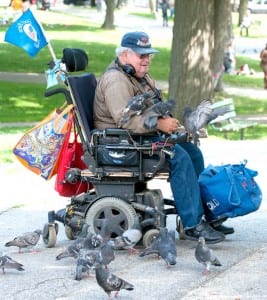
by Pigeon Patrol | Sep 4, 2014 | Bird Deterrent Products, Bird Netting, Pigeon Patrol's Services, Pigeons in the News, UltraSonic Bird Control
Ed Berube sits in his motorized scooter in the middle of Kennedy Park every nice day he can. As he digs into his giant bag filled with unshelled peanuts, pigeons begin to flock around him.

Jerk Pigeon Guy
Ed Berube, who many know as “Birdman,” feeds pigeons in Kennedy Park in Lewiston on Monday afternoon
“There’s the birdman with his flock,” said a person walking past him Monday afternoon.
But it’s the human flock Berube is really trying to reach.
“I use the birds and peanuts to open the door to talk about Christ,” he said. “I was born again 28 years ago,” he said, standing straight up out of his chair.
He has chronic breathing problems, so he gets short of breath walking. When he’s not with his “girlfriend,” a 1,400cc motorcycle parked just up the street, he is motoring around town on his scooter looking for somebody with whom to share his love of Jesus.
“I was trouble as a kid. I was run out of town in Massachusetts where I grew up,” he said. “They told my mother to take me away or they would send me away.”
He and his mother moved to Richmond, and he took jobs in the woods and on farms. He eventually moved to Lewiston to work in the Libbey Mill until it closed.
“I was just going on with life, drinking, drugging and all that. On Sunday, my wife would go to church and I’d start drinking. They kept inviting me to come, and when I finally did, I warned the pastor that he didn’t know what he was dealing with,” Berube said.
“It took about 17 months, but I finally felt the spirit kicking into gear. And then, it was like a light switch just flipped on,” he said.
Berube recited Scripture, then pulled out a zippered case with books and clippings in it. He thumbed through a Bible and challenges people to read the verses and not become changed.
“I just want to kick their spirit into gear,” he said, as he reached for another handful of peanuts for the pigeons circling closer and cooing.
About Pigeon Patrol:
Pigeon Patrol Products & Services is the leading manufacturer and distributor of bird deterrent (control) products in Canada. Pigeon Patrol products have solved pest bird problems in industrial, commercial, and residential settings since 2000, by using safe and humane bird deterrents with only bird and animal friendly solutions. At Pigeon Patrol, we manufacture and offer a variety of bird deterrents, ranging from Ultra-flex Bird Spikes with UV protection, Bird Netting, 4-S Gel and the best Ultrasonic and audible sound devices on the market today.
Voted Best Canadian wholesaler for Bird Deterrent products four years in a row.
Contact Info: 1- 877– 4– NO-BIRD (www.pigeonpatrol.ca)
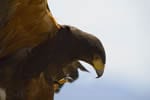
by Pigeon Patrol | Sep 4, 2014 | Bird Deterrent Products, Bird Netting, Pigeon Patrol's Services, Pigeon Spikes, Pigeons in the News
 Rufus the Hawk reports for duty weighing 625 grams.
Rufus the Hawk reports for duty weighing 625 grams.
Ten grams more and he’s too sedentary. Any lighter, and he ceases being the non-lethal deterrent Wimbledon contracts him to be and roams farther afield for mouse, snake or hare.
But if Rufus arrives at his optimum weight, he need only soar over centre court a few times to earn his hand-fed reward of raw chicken bits.
The mere sight of his one metre wingspan is enough to shoo away the pigeons that might otherwise land on the court during a critical point, deposit droppings in the Royal Box or roost in the eaves to feast on grass-seed all winter, as if the sod were a buffet table.
A 6-year-old Harris Hawk with prodigious self-esteem, Rufus is just one of several hundred actors in the meticulously choreographed dance that unfolds between dawn and 10.30am daily in London throughout the Wimbledon fortnight.
From strawberry-hullers to bomb-sniffing English Springer Spaniels, every man and beast has a task before the All England Club’s wrought-iron gates open to the tennis-mad public. And every task – whether mowing, measuring, marking, pruning, watering, soaring, sniffing, sweeping, scrubbing or polishing – has its appointed time for completion.
No detail is overlooked. Everything must be just so at the most esteemed of the four Grand Slams. A ticket to Wimbledon, after all, constitutes an invitation to a private club that opens to royals and commoners alike for two weeks each year to watch the world’s best players in the most pristine setting in sports.
“It’s all about the details,” says Lucy Tomlinson, 21, a member of Wimbledon’s daytime housekeeping staff, which from 7.30am onward restocks the loos with soap and hand towels, polishes the banisters, scrubs scuff marks from the entryways and wipes away beads of water left by the power-washing of ticket-holders’ seats.
“We make sure everything is absolute perfection!”
Neil Stubley, the head groundsman, starts his day with a 5.30am check of the forecast. Based on that, he directs his staff when to deflate the translucent covers on the 41 grass courts so they can be rolled up and stowed and the sod watered if the daily measurements of its hardness indicate there’s a need.
All of Wimbledon’s courts are oriented in a north-south direction. A specific groundskeeper is assigned to each court for the tournament’s duration. And each mows the rye grass to precisely 8 millimetres each morning, in exactly the same pattern of alternating stripes.
Every cutting is captured by the mower; even a stray snippet of grass could cause a player to slip.
“If Roger or Andy or Rafa goes out onto any of the practice courts in the morning and then comes out to any of the match courts, they should play exactly the same because we have controlled the moisture, the grass species and the cutting,” explains Stubley, who supervises a staff of 32 groundskeepers and gardeners.
Then come pairs of groundskeepers who mark the lines with titanium dioxide and set up the nets.
By that point, roughly 9am, David Spearing has started work at the golf course across Church Road that doubles as a camping ground for the thousands of fans in the queue for tickets.
Wimbledon’s honorary chief steward, Spearing has the privilege of informing the campers over a loudspeakers at 7.30am the number of tickets available for public sale that day and handing out the wristbands that guarantee entry to centre court, court 1 or the grounds in general.
It is but one of his duties. The other is sitting in the players’ guest box on centre court. Wimbledon is the lone major that seats the relatives, coaches and friends of both players in the same box. And Spearing, expert in protocol and discretion, is on hand to greet, seat, and on the rarest occasion, mediate.
“It’s basically an honour to have the job, rather than any particular ability,” says Spearing, who sits in the corner of the 39-seat box, with the top seed’s 19 guests to his right and the lower seed’s 19 guests to his left.
“Being pleasant is easy.”
Based on wags, few enjoy their early morning rounds more than dogs tasked with sniffing potential explosives. A mix of spaniels and retrievers, they scamper up and down the walkways, peer under benches and poke into trash bins positively quivering with excitement over the prospect of finding something that warrants a prize. At Wimbledon, naturally, that prize is a fuzzy yellow tennis ball.
Dogs, however, are one of the few sights that unsettle Rufus. So handler Imogen Davis, whose parents and five siblings breed and train raptors for a living, does her best to steer the hawk clear of Wimbledon’s canines. It’s not always easy, given that Rufus’s vision is 10 times better than her own.
“If Rufus was at one end of a football pitch, and a newspaper was at the other end, Rufus could read the headline!” Davis says by way of illustration.
“If he could read.”
One could get the impression Rufus can indeed read from his Twitter account, @RufusTheHawk, which reveals a raptor of cracking wit and considerable ego. Among his recent tweets: “Chasing pigeons is an art form, like poetry or twerking. And I, Rufus, am an artist.”
And, “The reason Sharapova is so loud when she serves is because she wants to scare away pigeons to be more like me.”
Apart from the sight of dogs, nothing rattles Rufus. Not the sound of Wimbledon’s lawn mowers. Not the sound of leaf blowers. Not even the fire alarm that gets a full-song test each morning at 9.35am.
It’s followed at 9.45am by a call over the public-address system for all staff and contractors to remove all vehicles and carts from the grounds in preparation for the opening of the gates, 45 minutes away.
And the pace of activity picks up.
Gardeners deadhead petunias and pluck yellowed leaves from ferns and hydrangeas at Centre Court’s South Entrance, where guests of the Royal Box enter.
The 250 ball boys and girls start arriving at Gate 13. They form a single-file line and march up the steps of St. Mary’s Walk without uttering a word, the only sound the pad of 500 sneakers on the pavement.
Aged 14 to 18, the schoolchildren have trained for this duty since late January, schooled by gym teacher Sarah Goldson in how to properly roll tennis balls between points, how to raise their right hand before feeding the ball to the server and, above all, how to stay still during play.
“They can move their eyes, and they can wriggle their toes,” Goldson says.
“But that’s about it.”
They also must wear their uniform correctly. Shoelaces must be tied in double knots. Shirts must be tucked in; trousers worn at the waist, not sagging in any manner. Water bottles must be tucked on the right side of their backpacks. And for girls, long hair must be tied back.
“Make-up, chewing gum is a big no-no.” Goldson adds.
“Jewellery, definitely not!”
As the ticket holders mass at the gates, the strawberry-sorters’ hands are flying in a chilled catering room tucked behind the grounds’ largest food court. Wearing green fleeces for warmth, a staff of six sits around a table and inspects and hulls the berries. They’re picked at 5am daily at a farm an hour’s drive away and delivered to the grounds by refrigerated trucks.
No scales are needed for the portioning out; it’s 10 strawberries per little plastic bowl. And roughly 8600 bowls, or “punnets,” are consumed daily.
Outside the sun inches higher in sky. The clock shows 10.25am, the next cue for Wimbledon’s public-address announcer.
“Attention ladies and gentlemen, we will shortly be opening the gates,” he advises.
“In the interest of your own and others’ safety, please do not run.”
In five minutes’ time, everything is in its place. The dogs have exited with their minders. The ball boys and girls have assumed their posts. Two towels have been placed on each player’s chair on every court. The air smells of petunias in full bloom.
And Rufus, having secured his realm for another day, has slipped on the custom leather hood that signals naptime and a job well done to Wimbledon’s brave hawk.
About Pigeon Patrol:
Pigeon Patrol Products & Services is the leading manufacturer and distributor of bird deterrent (control) products in Canada. Pigeon Patrol products have solved pest bird problems in industrial, commercial, and residential settings since 2000, by using safe and humane bird deterrents with only bird and animal friendly solutions. At Pigeon Patrol, we manufacture and offer a variety of bird deterrents, ranging from Ultra-flex Bird Spikes with UV protection, Bird Netting, 4-S Gel and the best Ultrasonic and audible sound devices on the market today.
Voted Best Canadian wholesaler for Bird Deterrent products four years in a row.
Contact Info: 1- 877– 4– NO-BIRD (www.pigeonpatrol.ca)
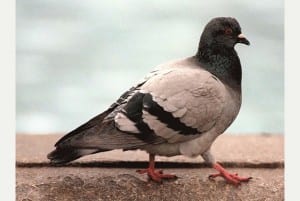
by Pigeon Patrol | Sep 4, 2014 | Bird Deterrent Products, Bird Netting, Pigeon Patrol's Services, Pigeon Spikes, Pigeons in the News
 A new pathogen has been discovered by scientists investigating major die-offs of pigeons native to North America, according to studies led by the University of California, Davis, and the California Department of Fish and Wildlife.Scientists were able to implicate this new parasite, along with the ancient parasite Trichomonas gallinae, in the recent deaths of thousands of Pacific Coast band-tailed pigeons. The die-offs occurred during multiple epidemics in California’s Central Coast and Sierra Nevada mountain ranges. Scientists named the new pathogen Trichomonas stableri.
A new pathogen has been discovered by scientists investigating major die-offs of pigeons native to North America, according to studies led by the University of California, Davis, and the California Department of Fish and Wildlife.Scientists were able to implicate this new parasite, along with the ancient parasite Trichomonas gallinae, in the recent deaths of thousands of Pacific Coast band-tailed pigeons. The die-offs occurred during multiple epidemics in California’s Central Coast and Sierra Nevada mountain ranges. Scientists named the new pathogen Trichomonas stableri.
Avian trichomonosis is an emerging and potentially fatal disease that creates severe lesions that can block the esophagus, ultimately preventing the bird from eating or drinking, or the trachea, leading to suffocation. The disease may date back to when dinosaurs roamed the earth, as lesions indicative of trichomonosis were found recently in T-Rex skeletons. The disease may also have contributed to the decline of the passenger pigeon, whose extinction occurred exactly 100 years ago.
Epidemics of the disease can result in the death of thousands of birds in a short amount of time. An outbreak in Carmel Valley killed an estimated 43,000 birds in 2007.
“The same parasite species that killed band-tailed pigeons during the outbreaks were also killing the birds when there weren’t outbreaks,” said lead author Yvette Girard, a postdoctoral scholar with the Wildlife Health Center in the UC Davis School of Veterinary Medicine at the time of the studies. “This indicates there may be other factors at play in the die-offs.”
“We are now investigating what triggers these die-offs, which may be caused by the congregation of infected and vulnerable birds during certain environmental conditions, or even spillover from another nearby species,” said principal investigator Christine Johnson, a professor with the UC Davis Wildlife Health Center.
Between winter 2011 and spring 2012, there were eight mortality events—defined as more than five dead birds found in the same geographic area during the same time frame. The study said trichomonosis was confirmed in 96 percent of dead, sick or dying birds examined at seven of the mortality events. This disease was also found in:
- 36 percent of band-tailed pigeons at wildlife rehabilitation centers
- 11 percent of hunter-killed band-tailed pigeons
- 4 percent of the birds caught live and released
“What makes this disease more troublesome for band-tailed pigeons is their low reproductive rate—about one chick per year—and also that these events are occurring in the wintertime,” said co-author Krysta Rogers, an environmental scientist with the California Department of Fish and Wildlife. “That means almost all the birds we’re losing during events are adult birds. They’re being killed before they have the ability to reproduce in the spring.”
Mortality events in band-tailed pigeons have been reported in California at least since 1945, but have increased during the last decade, with outbreaks reported in six of the last 10 years.
“Going into the study, we expected to find a single, highly virulent species of Trichomonas in birds sampled at outbreaks,” Girard said. “Having two species killing birds at these large-scale mortality events is surprising.”
Necropsies of the birds were conducted at the California Animal Health and Food Safety Laboratory at UC Davis and the Wildlife Investigations Laboratory at the California Department of Fish and Wildlife.
Both studies were funded by the California Department of Fish and Wildlife and the U.S. Fish and Wildlife Service.
About Pigeon Patrol:
Pigeon Patrol Products & Services is the leading manufacturer and distributor of bird deterrent (control) products in Canada. Pigeon Patrol products have solved pest bird problems in industrial, commercial, and residential settings since 2000, by using safe and humane bird deterrents with only bird and animal friendly solutions. At Pigeon Patrol, we manufacture and offer a variety of bird deterrents, ranging from Ultra-flex Bird Spikes with UV protection, Bird Netting, 4-S Gel and the best Ultrasonic and audible sound devices on the market today.
Voted Best Canadian wholesaler for Bird Deterrent products four years in a row.
Contact Info: 1- 877– 4– NO-BIRD (www.pigeonpatrol.ca)

 SEOUL, Sept. 5 (Korea Bizwire) – Piano wire, made for use in piano strings, has found a new, unexpected use in chasing pigeons away so that buildings and structures could avoid premature corrosion as well as bad odor and noise. The Seoul metropolitan city government said on September 4 that it has come up with a novel solution to keep birds away using piano wire by experimentally installing the line on Seongsan No. 1 Bridge and the Seoul Station Overpass.
SEOUL, Sept. 5 (Korea Bizwire) – Piano wire, made for use in piano strings, has found a new, unexpected use in chasing pigeons away so that buildings and structures could avoid premature corrosion as well as bad odor and noise. The Seoul metropolitan city government said on September 4 that it has come up with a novel solution to keep birds away using piano wire by experimentally installing the line on Seongsan No. 1 Bridge and the Seoul Station Overpass.







